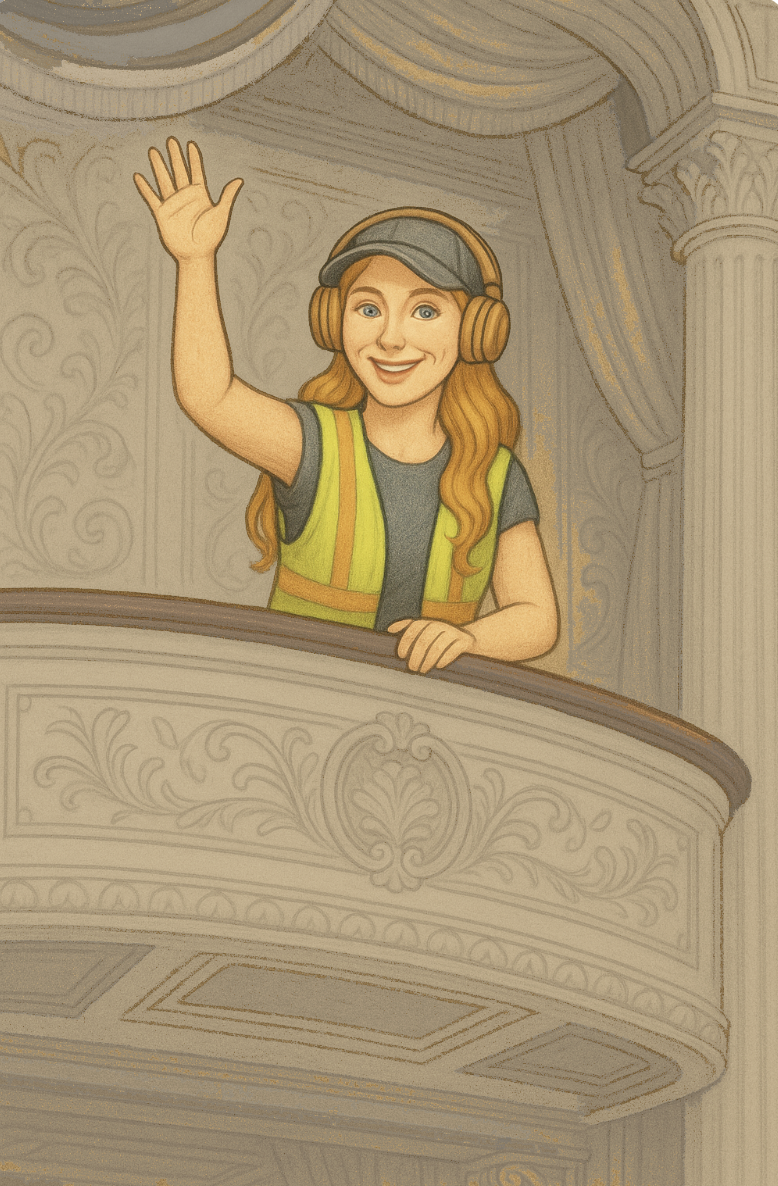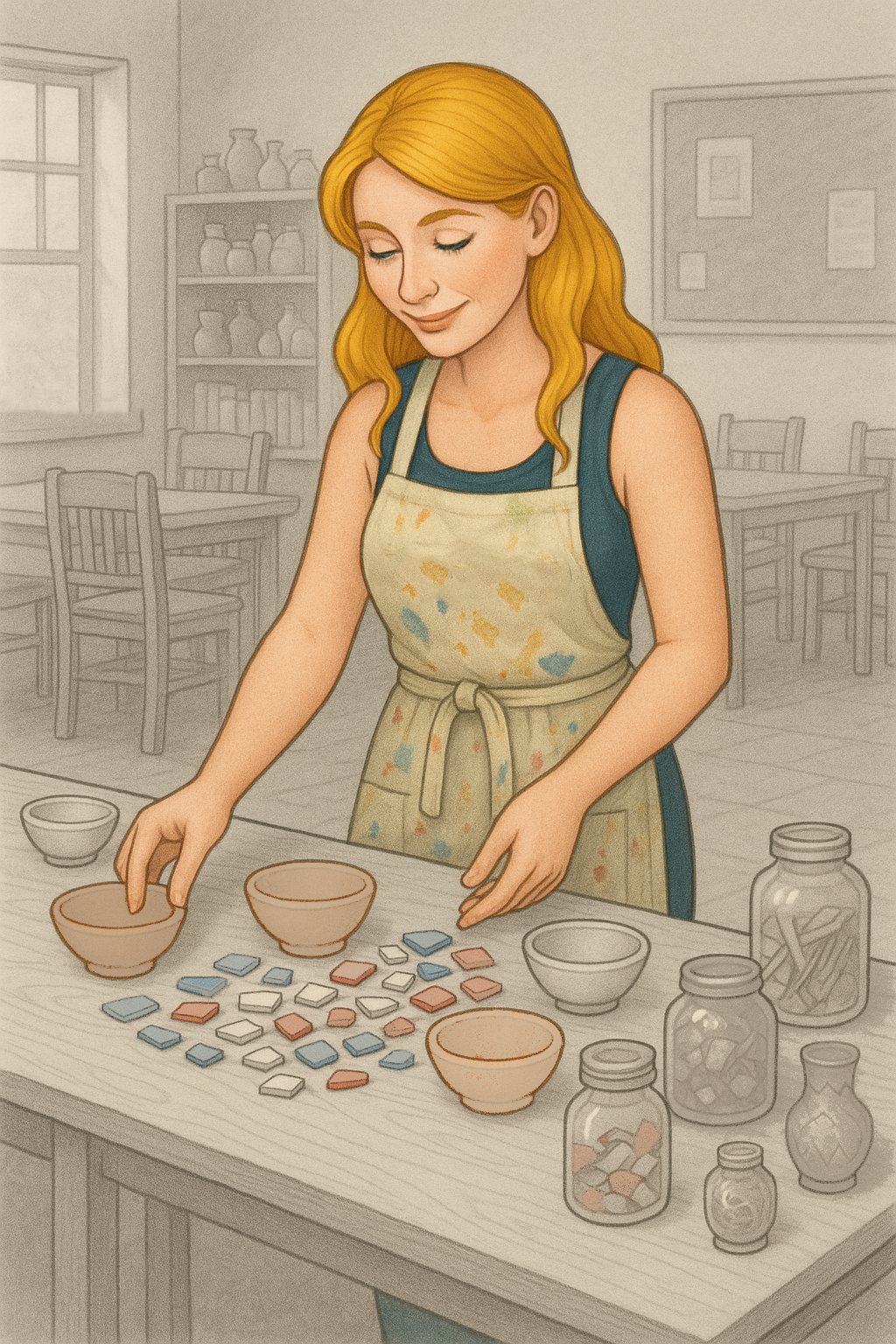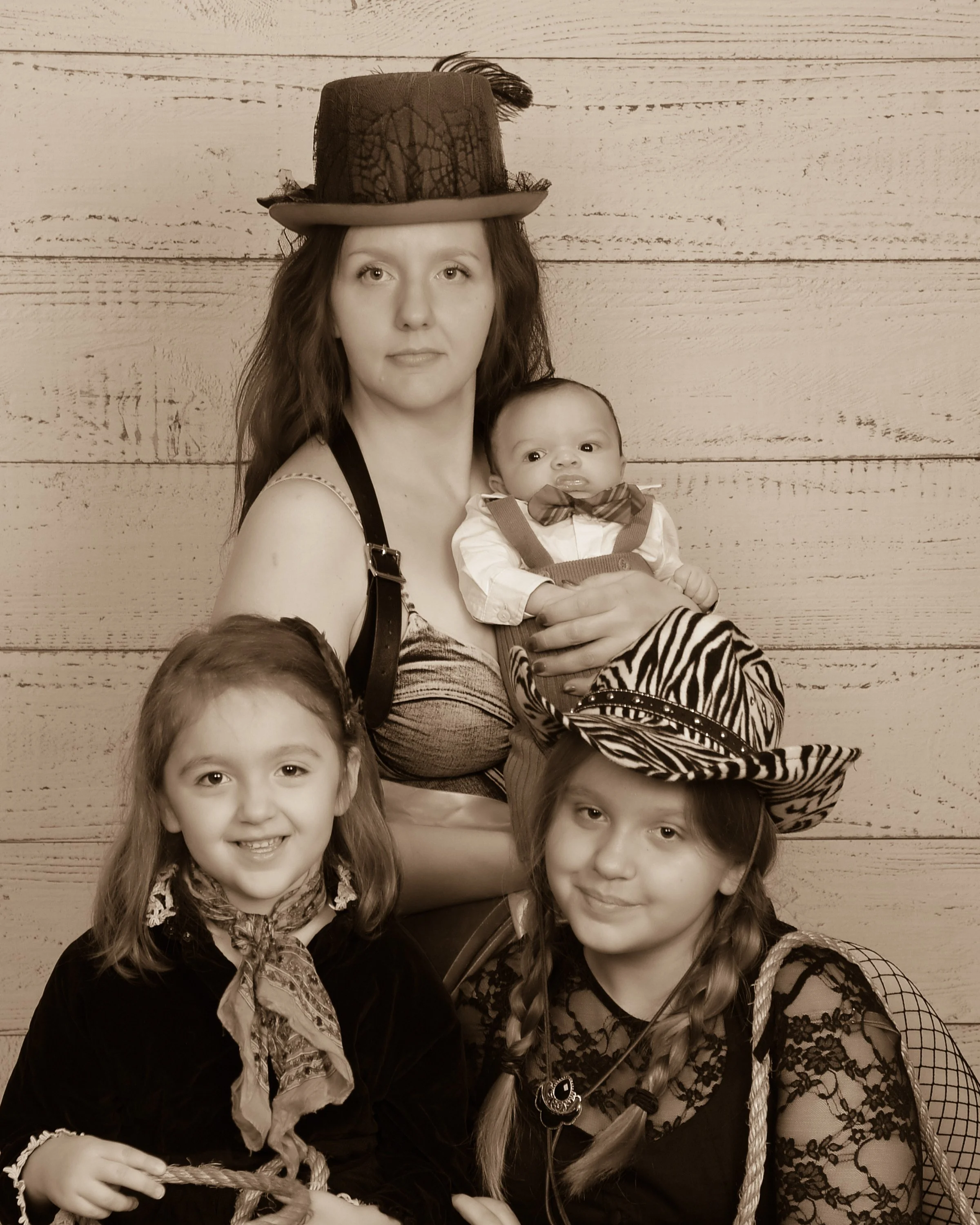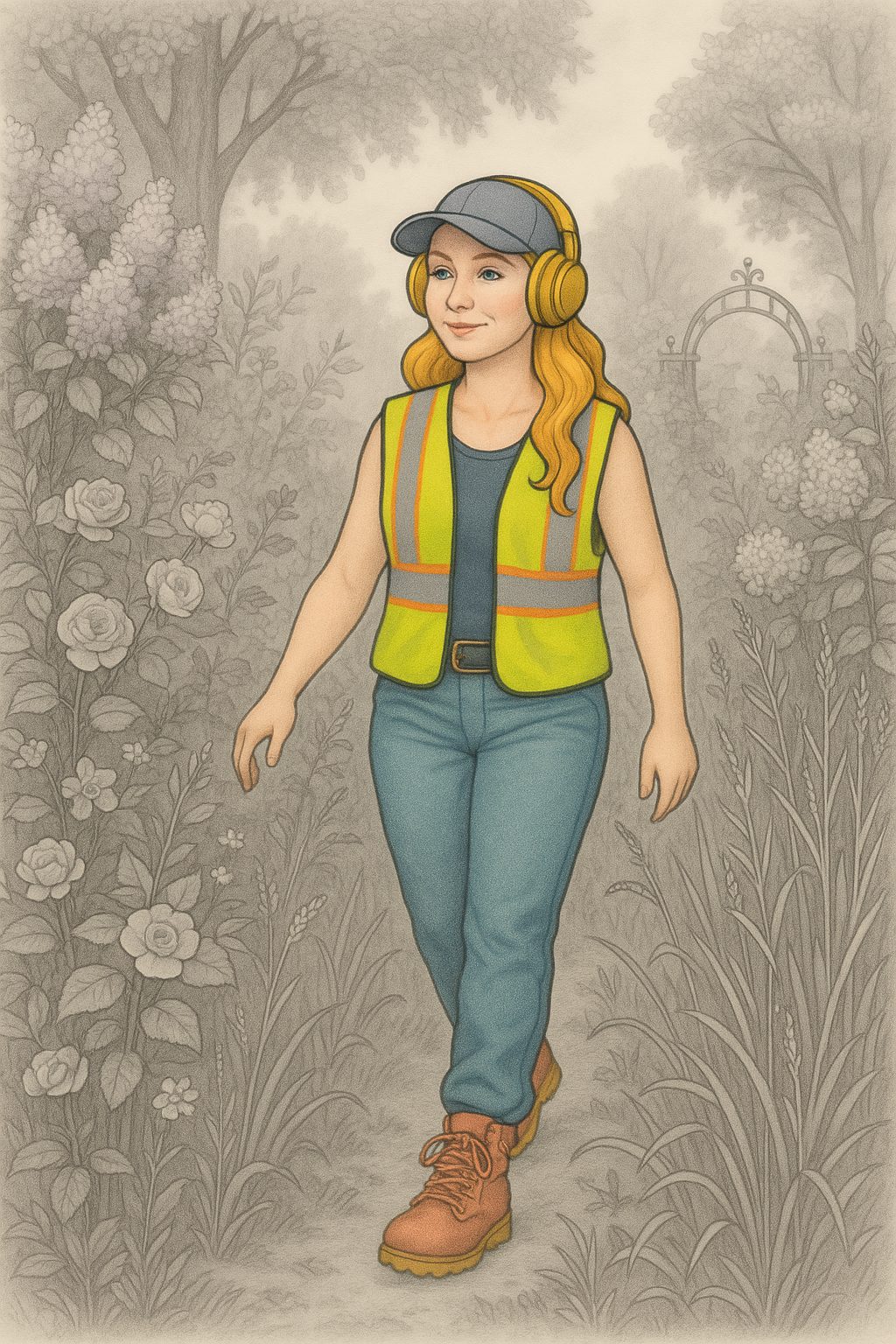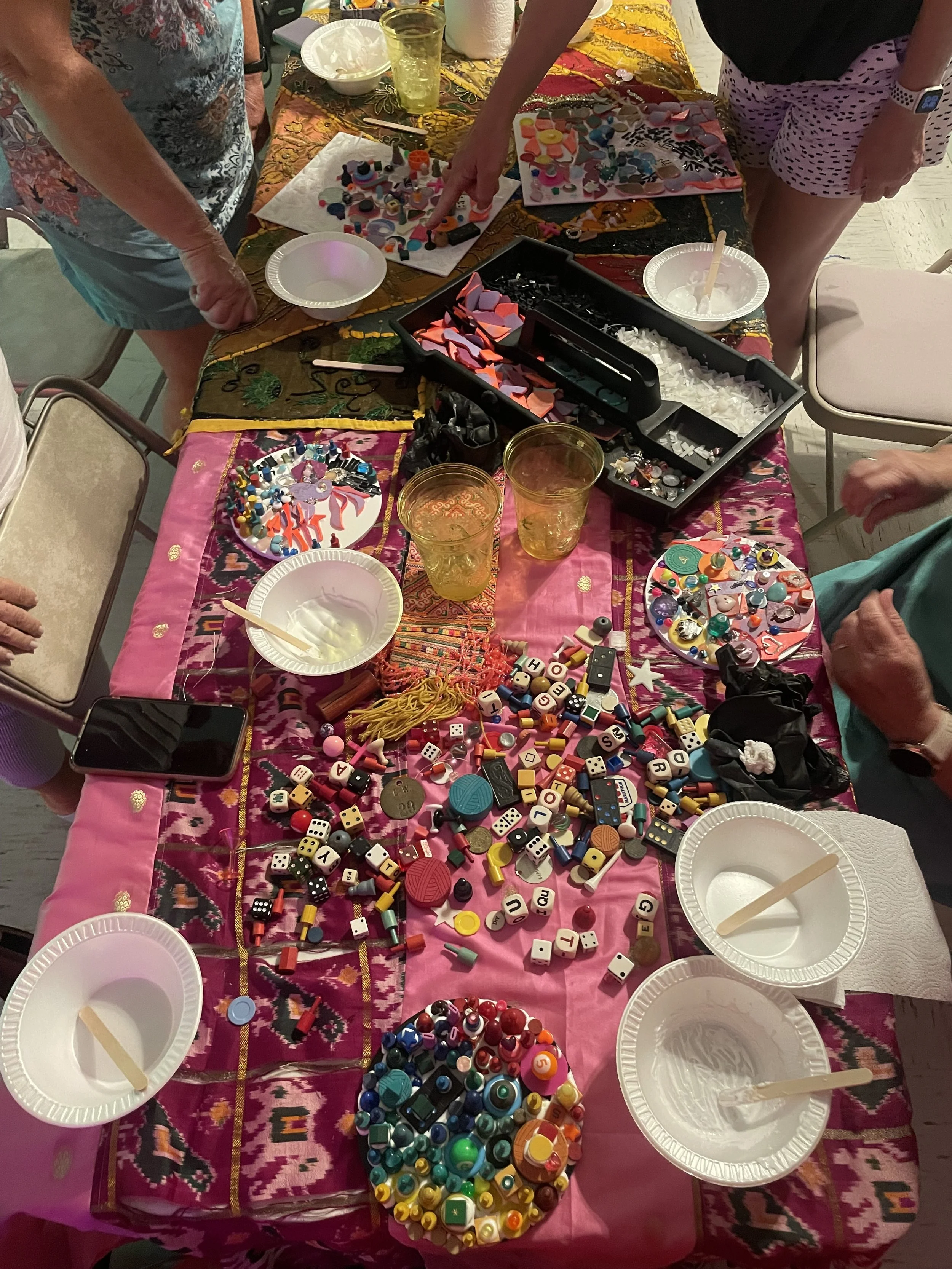Entry 5: The Souvenir Shelf (Part 1)
8/13/2025
NOTES FROM THE BALCONY, ENTRY #5
on wisdom in pieces, pocketed for later use.
Oh hey there, Sparker here. It's good to have you back again, and if this happens to be your first time on the balcony, I recommend beginning your journey here with Entry #1 (What The Trash Told Me), but you're welcome to start wherever you like. Take a seat, get comfortable, the show is about to begin.Today's format takes us down a different kind of path. First, we enter this room via a side door — through poetry. The opening poem functions as a framework for piecing together a seemingly unrelated list of anecdotes. It further acts as a clue, an easter egg, a message in a bottle (SOS), and key.Some lessons here arrive like a hammer to the chest, others creep in slowly. I’ve gathered mine in parking lot dumpsters and construction site trash, at strangers' houses, abandoned churches, in the dim candle light of my granny’s kitchen, and in the silence before falling asleep. Each one left a mark, and together they form the strange topography of my particular life — a map designed for my eyes, but that I’ll let you trace with yours for a little while. Maybe we can learn something together.Before we dive down the rabbit hole (didn’t you see the other door, there in the corner? didn’t you notice all the furniture is upside-down?), let’s start with something small enough to hold. A handful of words, arranged like objects on a table. A poem, meant to crack open the back alley entrance and let you step with quiet feet into the story.The Souvenir Shelf
I keep my lessons on a shelf,
Some are shared, others kept to myself.
A big jar of “Don’t” and a sparkly jar of “Do,”
And one for “Wait ‘til you think it through.”
I’ve got a box of “Oops, that stung,” (it’s heavy)
And “Wish I’d known when I was young.” (Fragile)
A drawer for “Yes!” and “Not again,”
And “That’s not how this story ends.” (My favorite)
I pull out trinkets, zip ties, beads—
Each one a map of where it all leads.
A mirror marked with “Don’t look back,”
A scrap of fabric threaded “Stay on track.”
So if you’re lost, just take a look—
My life’s a very messy book.
The pages torn, the margins bent—
and every word is time well spent.
ask me the moral, and I’ll just shrug and grin—
I’m still learning the lessons I’ve been living in.
1.
How is it possible that everything I have ever experienced is coming back to me now in my 36th year of life, as little paper-wrapped morsels of knowledge that I am only now discovering? One of the first ones I reach for is the most colorful, most delicious. It is labeled: how to throw a good party.My Aunt Olga is a party-throwing legend. She hosts in the specific way that makes you feel as if you had stumbled into a dream. You might not remember exactly who was there, but the golden feeling in the room, laughter, and clink of plates being piled with food cooked in a welcoming kitchen. Her parents had once owned a restaurant, the kind with a wide circle of regulars who didn’t just eat there but created a culture, a community. I've been told it was the kind of place where friendships swelled over dishes and lasted decades. That restaurant may have closed, but the spirit of it simply migrated to their home.My aunt must have learned the art of hosting from her parents — I am sure of it — the way some children inherit an ear for music or an ease with strangers. And I, in turn, learned it from her without even realizing. The constant observer, even as a child, I took in the choreography: how to carry a huge tray of dishes (never look down at what you're carrying, stay focused on the path, she'd say), when to slip away and return with something that made the conversation sparkle again, and how to keep up the appearance of never looking tired. There was an open-door policy in their home — not just in the literal sense, though that was true too, but in the deeper way of saying "you belong here".Whenever I host an event or class at Sparkerland now I think of her. I think of how I want my guests to feel cozy, yes, but also thought-provoked, surprised, maybe even a little dazzled. In that way, I suppose I try to go beyond what my aunt did, because my parties are as much about taking in art as they are about comfort and basic fun. But the thread runs straight back to her, to the kitchen where laughter was loud and coats piled on the guest bed, to the knowledge that welcoming people into your space is its own kind of creation, its own art form.
My aunt lives in my confident footsteps as I carry a tray full of mocktails to my mosaics class. "Don't look down", I think to myself, "Stay focused on the path".2.
I got this job back in 2017, working at an art museum in Ohio. I would drive an hour from Columbus each way just to get there, and the basic pay was hardly worth the time or gas, but it was *something* at least and, in the meantime, just good enough to keep my husband off my back until I could find a better paying gig. There was always a lot of pressure for me to make money. We definitely were not the type of couple where I was the stay-at-home 50s housewife and he worked to provide for the whole family. No. I never had any kind of protection or option for that lifestyle, not that I am sure I would have chosen it or even been happy if I had. And no shade thrown to those who are homemakers. It's just that my particular story includes a nagging, abusive husband and the monthly fear of eviction notices and car repossession. So I worked, wore our daughter in a sling on days when I had no other childcare options, dropped her off daily in south Austin for daycare when we lived in Texas, which added at least an extra hour and a half to my total daily commute (from north side, Burnet Rd. area if you're familiar).
Same thing when we lived in Ohio, I was the one who scrambled to find daycare, then did all the daily drop-offs and most pickups around my work schedule. When I was teaching at the museum, sometimes our daughter would come with me. I would walk her through the exhibitions, and she got to play dress-up in their basement kids gallery. I taught all kinds of classes there, from toddlers to adults, with only 30-minute changeovers between classes. It was hectic, but I thrived.Laying out styrofoam bowls, mosaic scraps, and creating stations for each of my students, I look at the clock. Oof. Only ten minutes until class starts. For a moment, I feel panicked, I am scrambling. Then a calm washes over me as the familiarity of work station setups at my museum job resurfaces. Moving with my hands while seeing a memory, a warm confidence starts to seep into my fingertips. The art room at the museum, the supplies, the book collection, the gift shop, all the amazing shows there. I remember my time in Italy too, climbing the steps of the Vatican to be greeted by the golden mosaics that grace the inner dome. I realize then, that I am threading all that I have ever learned into my life right now, into Sparkerland. I lay out the bowls. I gather our supplies. I tell myself: "You've already done this, just keep going."3.
In grad school, I once had a professor named Tim. He taught screen printing and I was his TA for at least one semester (though it may have been two or more). My specialty was in another printmaking form entirely — intaglio, which involves cutting grooves into metal to create an image — so I came into his class carrying the comfortable arrogance of a person who knows the smell of acid baths and the way a copper plate should be wiped, but who is suddenly in foreign territory with silkscreens, vacuum tables, emulsions.Tim was a Bible-thumping West Texan with a drawl so thick it sometimes wrapped around his words and swallowed them whole. He hated punk rock and metal, which felt like a small betrayal to his own community of counter-culture printmakers, but he certainly knew the process of printmaking itself. He carried it in his hands, in his posture, the way he could make a squeegee glide like a violin bow across the surface of a screen.
I chose to observe him carefully. I watched the way his students’ shoulders would slump when they didn’t get it, and the way he sometimes missed that collapse entirely. I learned the practical steps of the process from him, but more than that, I learned how to be an intuitive teacher — how to read the subtle body language that says, "I’m lost but I don’t want to admit it". My role became translator. I learned how to bridge the gap, to be the connective tissue between Tim's confident and brilliant execution and the blank stares of his students, who were often confused by him entirely. It was an odd position to find myself in, not knowing enough about the process itself but wearing the mask of reassurance and guidance toward those who were taking the class. He reminded me that even though a person can be gifted and advanced in their technique, to act as a mentor and teacher is a whole skill in itself, and takes a certain way of relating with people. Isn't parenting like that too sometimes? We put on the mask of "I've got this" even when we don't, just so their little hearts won't be worried.Family portrait, May 2024
I don't rely on my technical skillsets to carry me through life, though it helps tremendously to have them. My survival in this world has become a combination of many things. One of them being the need to intuitively understand others. Myself. My kids. Even strangers.4.
A friend recently told me there are parts of my brain he loves, and parts he “wouldn’t touch with a ten-foot pole.”
It was said pretty seriously, and landed in me like a stone thrown into a pond, sending out ripples that hit the shore weeks later.
I try to imagine which parts he means.
Are they jagged? Dark? Embarrassing? Or are they simply too vast, too untamed to be mapped by someone else’s compass?
The comment has become a kind of touchstone, a small and unwelcome souvenir I keep turning over in my palm. I wonder: what if I leaned all the way in to that unapproachable territory instead of trying to sand it down for company? Could I find out what he meant, without even asking him? What if that part of me he wouldn’t touch is the part I most need to nurture, to let grow wild?
It’s uncomfortable, realizing there are landscapes in yourself that others might skirt around, like a thicket too dense for a casual stroll. But maybe that’s the point. Not everyone should be able to walk through every acre of me.
I’ve started making very intentional pilgrimages into that territory recently. Listening. Writing. Letting the weeds grow taller. Maybe it’s not something to fear at all — maybe it’s the most honest part of me. And if it’s repulsive to someone else (even a perceivably close friend), perhaps that’s just another way the universe naturally sets boundaries, shaping who’s meant to stay, and who’s meant to keep walking.5.
I glance inside the busy coffee shop — no one I’m meeting is there yet — and without thinking, I turn immediately to leave. That’s when I see it: my car, just across the street, being booted by some kid who looks like he's wearing a phony police badge from the dollar store.
I’m running before I even process it, cutting straight into rush hour traffic on Halsted, dodging honking cars. My phone slips from my hand mid-stride, skittering across the asphalt. More cracks in the screen — perfect. A man on the curb retrieves it and hands it to me, bewildered. I barely nod my thanks.“Sir! Sir!” I call out to the man (boy?) crouched by my wheel. “Please — I’m right here.”
But this isn’t some misunderstanding. He and his partner have been sitting in their cars like vultures, waiting for anyone to step into that strip mall lot without patronizing its businesses. It’s a sting operation disguised as parking enforcement.
I scan the signs posted above me — the cluster of logos for the shops I apparently should have been frequenting. I latch onto one: a vitamin store. “I was just going in there,” I tell him, feigning confusion. I point toward the storefront like it’s the lighthouse to my shipwreck. He narrows his eyes, mutters something, and stalks off toward a big man leaning against a black SUV — the boss.
I walk straight toward the vitamin store, posture tall, the embodiment of indignant righteousness. The doors are locked. Closed on Sundays. But they don’t need to know that. (Secures mask firmly on head)
The boss waves me over. I repeat my story, layering on just enough confusion to be plausible. The boot guy insists I wasn’t anywhere near my car. I tell them I accidentally stepped into the coffee shop but didn’t order anything, that the signage was confusing and I’m not from the area.
They switch to Spanish, talking fast. And that’s when something in me shifts. I rarely use my Spanish anymore. It carries too much weight — too many memories of my ex-husband, who wielded the language like a private blade, scolding me publicly in his native tongue. But tone is its own universal language, and I’d learned to read it like sheet music.
Without thinking twice, I let the words loose, smooth and deliberate, stepping into their conversation with perfect clarity. Their faces change instantly — surprise, then apology. The two men backpedal, almost bowing. The boot comes off. I walk away victorious, heart pounding, half from adrenaline, half from something older. I tell you, that is the power women can sometimes hold (with our sexuality, but also with our cunning ways) if we allow ourselves to just fully let go, free fall backwards into the lessons of a lifetime. Acting with the self-assuredness that we have already passed every test needed to get here, and that the knowledge is already present, maybe in some secondhand trophy, or in some rock in the pocket of our jeans.
And here’s the lesson: sometimes the tools you carry — the language, the cunning, the willingness to play the part — are souvenirs from darker times. You don’t have to use them often, but when you do, you use them like you’ve passed every test life could throw at you. You use them like you’ve earned the right to never be booted again.Mosaics & Mocktails, recently taught at sparkerland
